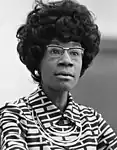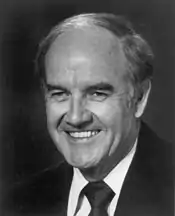1972 Democratic Party presidential primaries
From January 24 to June 20, 1972, voters of the Democratic Party chose its nominee for president in the 1972 United States presidential election. Senator George McGovern of South Dakota was selected as the nominee through a series of primary elections, caucuses, and state party conventions, culminating in the 1972 Democratic National Convention held from July 10 to July 13, 1972, in Miami, Florida.
| |||||||||||||||||||||||||||||||||||||||||||||||||||||||||||||
3,014 delegates to the 1972 Democratic National Convention 1,509 delegate votes needed to win | |||||||||||||||||||||||||||||||||||||||||||||||||||||||||||||
|---|---|---|---|---|---|---|---|---|---|---|---|---|---|---|---|---|---|---|---|---|---|---|---|---|---|---|---|---|---|---|---|---|---|---|---|---|---|---|---|---|---|---|---|---|---|---|---|---|---|---|---|---|---|---|---|---|---|---|---|---|---|
| |||||||||||||||||||||||||||||||||||||||||||||||||||||||||||||


McGovern Wallace Humphrey Muskie Chisholm Jackson Mills | |||||||||||||||||||||||||||||||||||||||||||||||||||||||||||||
| |||||||||||||||||||||||||||||||||||||||||||||||||||||||||||||
Background
1968 election
The 1968 election was one of the most eventful and influential in the history of the Democratic Party. The primaries were contested by President Lyndon B. Johnson, Senator Eugene McCarthy, and Senator Robert F. Kennedy. In a shock, McCarthy forced the incumbent President out of the race early by his strong showing in the New Hampshire primary. Kennedy joined the race soon thereafter, and the two ran on their opposition to Johnson's handling of the Vietnam War. They traded primary victories until Kennedy was assassinated in June.
Although Kennedy and McCarthy contested the popular elections, most of the delegates in 1968 were not popularly elected. Thus, with Kennedy dead and McCarthy lacking support from the party establishment, Johnson's vice president Hubert H. Humphrey was easily nominated on the first ballot at the 1968 Democratic National Convention. Humphrey's nomination, the continuing Vietnam War, and the generally closed nature of the nomination process drew massive protests to Chicago; the convention was generally seen as a major embarrassment for the Party, and Humphrey went on to lose the election narrowly to Richard Nixon.
McGovern-Fraser Commission
In response to the 1968 debacle, party leadership established a twenty-eight member committee selected by Senator Fred R. Harris to reform the presidential nomination process for 1972. The committee was led by Senator George McGovern and Representative Donald M. Fraser. After less than nine months, the committee delivered its guidelines.
The committee focused on two main principles: uniformity and equity. Guidelines required states adopt uniform, explicit delegate selection rules and weight the delegate allocation in favor of politically marginalized groups (women, blacks and those under the age of 30), including the use of quotas.
In general, the state parties complied with the McGovern-Fraser guidelines by adopting the use of primary elections, rather than delegate selection caucuses or conventions. Thus, the 1972 Democratic nomination is typically considered the first modern presidential primary campaign. Harris and McGovern, having played a direct role in the reforms and having a detailed knowledge of their impact, were seen to gain an advantage as potential candidates for the nomination.
Nixon administration and 1970 midterm elections
As 1972 approached, President Richard Nixon faced uncertain re-election prospects. Nixon had been elected on a platform to end American involvement in Vietnam, but his strategy of gradual "Vietnamization" had proceeded more slowly than planned. The Paris Peace Talks had bogged down, dimming hopes for a negotiated settlement to the war. In fact, Nixon had widened the conflict by invading Cambodia in 1970, a move that ignited criticism in the press and Congress and widespread disorder on college campuses, including the Kent State shootings in May 1970.
On the domestic front, a sharp recession had shaken investor confidence, and Nixon's plan to control inflation with wage and price controls had failed to meet its objective. The administration's attempt to steer a middle course on desegregation busing and affirmative action had displeased liberals and conservatives alike.
In the 1970 elections, Democrats gained a dozen seats in the House, although their Senate majority was slightly reduced by three seats. Their main success was not in Congress, however, but the states. Eleven different Democratic governors were elected to seats held by Republicans and not a single incumbent Democrat lost re-election.
Pre-primary maneuvering
Given Nixon's apparent weakness and the novel use of the primary system, a large field of credible Democratic challengers emerged.
Early speculation surrounded Senator Ted Kennedy, the brother of the late Senator Robert F. Kennedy who had contested the 1968 nomination. He ruled himself out early in 1971, but nevertheless continued to lead in opinion polling. In the event of a brokered convention, some believed Kennedy could emerge as the consensus nominee. Kennedy supporters took key positions on a number of presidential campaigns, strengthening his odds of gaining the candidates' support in the event they could not secure the required delegates.[1]
With Kennedy out, the establishment favorite for the Democratic nomination was Edmund Muskie,[2] a moderate Senator who had acquitted himself well as Humphrey's running mate in 1968. In August 1971 polling amid a growing economic crisis, Muskie led Nixon.[2]
U.S. Representative Shirley Chisholm from Queens announced her candidacy in January 1972,[3] making her the first black candidate to contest a major party's nomination for President.[3][lower-alpha 1] Chisholm was also the first woman to run for the Democratic presidential nomination; she was later joined by Patsy Mink of Hawaii.[lower-alpha 2]
Candidates
Nominee
| Candidate | Born | Most recent position | Home state | Campaign | PD | Votes | Ref. | |
|---|---|---|---|---|---|---|---|---|
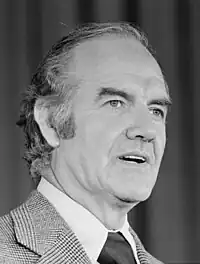 George McGovern |
July 19, 1922 (age 49) Avon, South Dakota |
U.S. Senator from South Dakota (1963–1981) |
South Dakota |
 Announced: January 18, 1971 Nominated at convention: July 13, 1972 |
1,378.90 | 4,051,565 | [4][5][6] | |
Candidates
| Candidate | Born | Most recent position | Home state | Campaign | PD | Votes | Ref. | |
|---|---|---|---|---|---|---|---|---|
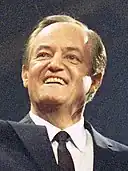 |
May 27, 1911 (age 61) Wallace, South Dakota |
U.S. Senator from Minnesota (1949–1964; 1971–1978) Vice President of the United States (1965–1969) |
.svg.png.webp) Minnesota |
Declared: January 10, 1972 |
386.30 | 4,119,230 | [4][5][7] | |
_(3x4).jpg.webp) |
August 25, 1919 (age 52) Clio, Alabama |
Governor of Alabama (1963–1967; 1971–1979; 1983–1987) |
 Alabama |
Declared: January 13, 1972 |
377.00 | 3,755,424 | [4][5][8] | |
_(croppedmore).jpg.webp) |
March 28, 1914 (age 58) Rumford, Maine |
U.S. Senator from Maine (1959–1980) U.S. Secretary of State (1980–1981) |
 Maine |
Declared: January 4, 1972 Suspended campaign: April 27, 1972 |
209.10 | 1,838,314 | [4][5][9][10] | |
-cropped.jpg.webp) |
May 31, 1912 (age 60) Everett, Washington |
U.S. Senator from Washington (1953–1983) |
Washington |
 Declared: November 19, 1971 Suspended campaign: May 2, 1972 |
53.75 | 504,596 | [4][5][11][12] | |
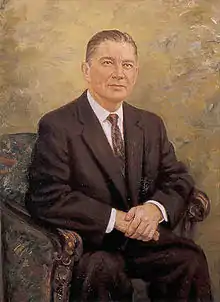 |
May 24, 1909 (age 63) Kensett, Arkansas |
U.S. Representative from Arkansas (1939–1977) |
.svg.png.webp) Arkansas |
Declared: February 11, 1972 |
30.55 | 37,401 | [4][5][13] | |
 |
November 30, 1924 (age 47) Brooklyn, New York |
U.S. Representative from New York (1969–1983) |
New York |
 Declared: January 25, 1972 |
28.65 | 430,733 | [4][5][14] | |
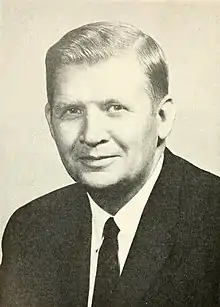 |
August 20, 1917 (age 55) Laurinburg, North Carolina |
Governor of North Carolina (1961–1965) |
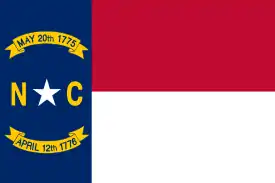 North Carolina |
 Declared: March 8, 1972 |
27 | 331,415 | [4][5][15] | |
.jpg.webp) |
November 24, 1921 (age 50) New York City, New York |
Mayor of New York City (1966–1973) |
New York |
 Declared: December 28, 1971 Withdrew: April 4, 1972 |
6 | 196,406 | [4][5][16][17] | |
.jpg.webp) Eugene McCarthy |
March 29, 1916 (age 56) Watkins, Minnesota |
U.S. Senator from Minnesota (1959–1971) |
.svg.png.webp) Minnesota |
Declared: December 17, 1971 |
0 | 553,352 | [4][5][18] | |
.jpg.webp) |
October 1, 1909 (age 62) Lincoln, Nebraska |
Mayor of Los Angeles (1961–1973) |
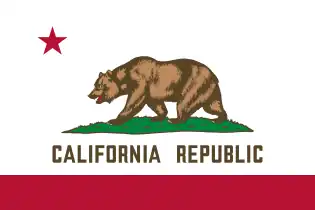 California |
 Declared: November 16, 1971 Withdrew: June 5, 1972 (endorsed Humphrey) |
0 | 79,446 | [4][5][19][20] | |
 |
May 31, 1919 (age 53) Stendal, Indiana |
U.S. Senator from Indiana (1964–1973) |
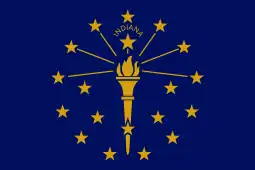 Indiana |
 Declared: January 3, 1972 Withdrew: March 26, 1972 (endorsed Humphrey) |
0 | 11,798 | [4][5][21] | |
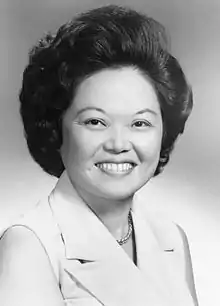 |
December 6, 1927 (age 44) Hāmākua Poko, Hawaii Territory |
U.S. Representative from Hawaii (1965–1977) |
Hawaii |
(Campaign) Declared: October 19, 1971 Withdrew: May 24, 1972 |
0 | 8,286 | [4][5][22][23] | |
.jpg.webp) |
November 13, 1930 (age 41) Walters, Oklahoma |
U.S. Senator from Oklahoma (1964–1973) |
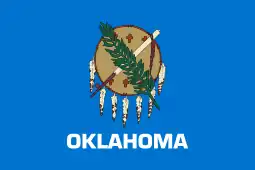 Oklahoma |
Declared: September 24, 1971 Withdrew: November 10, 1971 (endorsed McGovern on April 27) |
0 | 0 | [4][5][24][25][26] | |
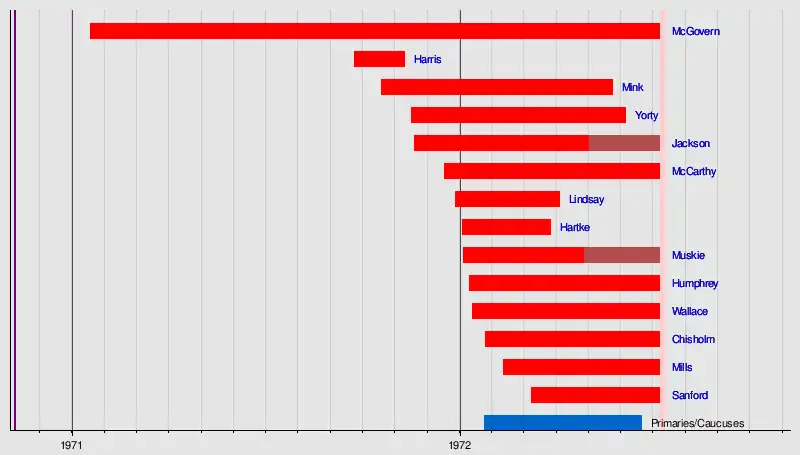
Declined
- Birch Bayh, U.S. Senator from Indiana (declined October 12, 1971)[27]
- Harold Hughes, U.S. Senator from Iowa (declined July 15, 1971)[28]
- William Proxmire, U.S. Senator from Wisconsin (declined November 6, 1971; endorsed McGovern on March 31)[29][30]
Favorite sons
- Walter Fauntroy, Delegate to the U.S. House of Representatives from the District of Columbia[31]
- Wayne Hays, U.S. Representative from Ohio[32]
- Carl Stokes, Mayor of Cleveland[32]
Polling
National polling
| Poll source | Publication | |||||||||||||||||
|---|---|---|---|---|---|---|---|---|---|---|---|---|---|---|---|---|---|---|
| Gallup | Jan. 1969 | — | — | — | — | — | 21% | — | — | 45% | — | 15% | 3% | — | 17% | — | — | — |
| Gallup | Oct. 1969 | — | — | — | — | — | 29% | — | — | 27% | — | 10% | 5% | — | 24% | — | — | — |
| Gallup | May. 1970 | — | — | — | 1% | 1% | 16% | 10% | — | 17% | — | 9% | 3% | — | 23% | — | — | — |
| Gallup | Nov. 1970 | — | — | — | — | — | 16% | 4% | — | 31% | 1% | 6% | 2% | — | 33% | 2% | — | — |
| Gallup | Feb. 1971 | — | — | — | — | — | 21% | 5% | — | 25% | — | 4% | 5% | — | 26% | — | — | — |
| Gallup | Apr. 1971 | 1% | — | 1% | — | 1% | 18% | 4% | 2% | 29% | 2% | 3% | 5% | 1% | 21% | 2% | — | — |
| Gallup | Apr. 1971 | 1% | — | 1% | — | 1% | 18% | 4% | 2% | 29% | 2% | 3% | 5% | 1% | 21% | 2% | — | — |
| Gallup | Jul. 1971 | 2% | — | 1% | — | 1% | 18% | 3% | 2% | 22% | 1% | 6% | 5% | 1% | 22% | 1% | — | — |
| Gallup | Aug. 1971 | — | — | — | — | — | 13% | 6% | — | 26% | — | 4% | 6% | — | 22% | — | — | — |
| Harris[33] | Sep. 1971 | — | — | — | 1% | — | 16% | 7% | 2% | 26% | — | 5% | 4% | 2% | 19% | 1% | — | — |
| — | — | — | 1% | — | 27% | 11% | 2% | — | — | 7% | 5% | 2% | 27% | 2% | — | — | ||
| Gallup | Nov. 1971 | — | — | — | — | — | 19% | 4% | 6% | 29% | — | 5% | 6% | — | 24% | — | — | — |
| Harris[34] | Nov. 1971 | — | — | — | — | — | 15% | 9% | 2% | 25% | — | 3% | 5% | 1% | 22% | 1% | — | 1% |
| — | — | — | — | — | 25% | 12% | 2% | — | — | 4% | 6% | 2% | 27% | 2% | — | 1% | ||
| Gallup | Dec. 1971 | — | — | — | — | — | 19% | 4% | 4% | 32% | — | 4% | 5% | — | 25% | — | — | 1% |
| — | — | — | — | — | 34% | 8% | 5% | — | — | 5% | 8% | — | 31% | — | — | 1% | ||
| Gallup | Jan. 1972 | — | 2% | — | — | — | 17% | 5% | 2% | 27% | — | 5% | 3% | — | 32% | — | — | 2% |
| — | 2% | — | — | — | 29% | 7% | 3% | — | — | 8% | 3% | — | 39% | — | — | 2% | ||
| Harris[35] | Jan. 1972 | — | 3% | — | — | — | 23% | 7% | 5% | — | — | 6% | 5% | — | 30% | — | — | 1% |
| Gallup | Feb. 1972 | — | 2% | — | — | — | 23% | 2% | 3% | 24% | — | 3% | 5% | — | 29% | — | — | 1% |
| — | 3% | — | — | — | 32% | 5% | 4% | — | — | 4% | 6% | — | 35% | — | — | 1% | ||
| Harris[36] | Feb. 1972 | — | 5% | — | — | — | 18% | 6% | 4% | 15% | — | 5% | 5% | — | 22% | — | 11% | 1% |
| — | 6% | — | — | — | 21% | 7% | 3% | — | — | 5% | 8% | — | 28% | — | 12% | 1% | ||
| Gallup | Mar. 1972 | — | 2% | — | — | — | 31% | 7% | 3% | — | — | 5% | 6% | 2% | 23% | — | 15% | * |
| — | 3% | — | — | — | 35% | 8% | 5% | — | — | 6% | 7% | 2% | 28% | — | — | 1% | ||
| Gallup | Mar. 1972 | — | 4% | — | — | — | 31% | 5% | 5% | — | — | 4% | 5% | 1% | 22% | — | 17% | * |
| Gallup | Apr. 1972 | — | 5% | — | — | — | 30% | — | 4% | — | — | 3% | 17% | 1% | 17% | — | 19% | 1% |
| Gallup | May 1972 | — | 3% | — | — | — | 35% | — | 3% | — | — | 3% | 20% | 2% | 11% | — | 18% | — |
| Gallup | May 1972 | — | — | — | — | — | 26% | — | — | — | — | — | 25% | — | — | — | 26% | — |
| Gallup | Jun. 1972 | — | 3% | — | — | — | 27% | — | 3% | — | — | 2% | 30% | 1% | 6% | — | 25% | — |
Primary campaign
Hubert Humphrey made another run at the nomination, in an era when previous nominees were considered legitimate contenders even after losing a general election (Adlai Stevenson had been successful at being re-nominated by Democrats in 1956, and Nixon by the GOP in 1968). He fell just short in delegates, despite winning the popular vote in the 24 states and the District of Columbia which held preference primary and caucus elections open to the rank and file Democratic voter. His bid to contest the results of the California winner-take-all primary failed. Humphrey, like Senator Henry "Scoop" Jackson, was considered the favorite of the party establishment after Muskie's withdrawal.
Alabama governor George Wallace, with his "outsider" image, did well in the South (he won every county in the Florida primary with the exception of Miami-Dade)[37] and among alienated and dissatisfied voters. What might have become a forceful campaign was cut short when Wallace was shot while campaigning, and left paralyzed in an assassination attempt by Arthur Bremer. Within hours of the assassination attempt, then-President Richard M. Nixon and a top aide dispatched a political operative, E. Howard Hunt, who rushed to Milwaukee, with plans to surreptitiously enter Bremer's apartment, and plant the campaign literature of Democratic contender George McGovern's campaign as a means to drive Wallace supporters away from the Democratic Party and toward Nixon and Republican candidates. Hunt aborted his clandestine operation after the FBI had already sealed off Bremer's apartment prior to his arrival.[38][39]
Chairman of the House Ways and Means Committee Wilbur Mills was drafted by friends and fellow Congressmen to make himself available as a candidate for the primaries. To position himself to appeal to senior citizens during the 1972 presidential campaign, Mills championed the automatic Cost Of Living Adjustment (COLA) to Social Security. He was not strong in the primaries and won 33 votes for president from the delegates at the 1972 Democratic National Convention which nominated Senator George McGovern.
Washington Senator Scoop Jackson was little known nationally when he first ran for President in 1972. McGovern accused Jackson of racism for his opposition to busing. Jackson's high point in the campaign was a distant third in the early Florida primary, but he failed to stand out of the pack of better-known rivals, and only made real news later in the campaign as part of the "Anybody but McGovern" coalition, that raised what would be known as the "Acid, Amnesty and Abortion" questions about McGovern. Jackson suspended active campaigning in May after a weak showing in the Ohio primary. Jackson did re-emerge at the August Democratic convention after runner-up Humphrey dropped out of the race. Jackson's name was placed in nomination by Georgia Governor Jimmy Carter, and he finished second in the delegate roll call, well behind nominee McGovern.[40][41]
March 7: New Hampshire
Prior to the New Hampshire primary, the "Canuck Letter" was published in the Manchester Union-Leader. The letter (later revealed to have been forged as part of the "dirty tricks" campaign by Nixon staffers)[42] claimed that Muskie had made disparaging remarks about French-Canadians. The paper subsequently published an attack on Muskie's wife Jane, reporting that she drank and used off-color language. Muskie made an emotional defense of his wife in a speech outside the newspaper's offices during a snowstorm. Though Muskie later stated that what had appeared to the press as tears were actually melted snowflakes, the press reported that Muskie broke down and cried.[43] Muskie did worse than expected in the primary, while McGovern came in a surprisingly close second. McGovern now had the momentum, which was well orchestrated by his campaign manager, Gary Hart.
May 15–16: Attempted Wallace assassination, Maryland, and Michigan
While campaigning in Laurel, Maryland, on May 15, 1972, Wallace was shot five times by Arthur Bremer. Three others wounded in the shooting also survived. Bremer's diary, published after his arrest as a book titled An Assassin's Diary, showed that Bremer's assassination attempt was not motivated by politics, but by a desire for fame, and that President Nixon had been a possible target. The assassination attempt left Wallace paralyzed for the rest of his life, as one of the bullets had lodged in his spinal column.
As a result of the shooting, President Nixon dispatched Secret Service protection to Representatives Shirley Chisholm and Wilbur Mills (two candidates who had not been assigned Secret Service details up to then) as well as Senator Ted Kennedy (though not running, because of his brothers John and Robert having been assassinated).[44]
Following the shooting, Wallace won the May 16 primaries in Maryland and Michigan. Wallace spoke at the Democratic National Convention from his wheelchair in Miami on July 11, 1972. Bremer was sentenced to 53 years in prison for the shooting. He served 35 years of the sentence and was released on parole on November 9, 2007.
Endorsements
Gloria Steinem and Betty Friedan ran as Chisholm delegates in New York.[3] By the 1972 election, the women's movement was rapidly expanding its political power. Steinem, along with Congresswomen Chisholm and Bella Abzug, had founded the National Women's Political Caucus in July 1971.[45]
Nevertheless, Steinem was reluctant to re-join the McGovern campaign. Though she had brought in McGovern's single largest campaign contributor in 1968, she "still had been treated like a frivolous pariah by much of McGovern's campaign staff." And in April 1972, Steinem remarked that he "still doesn't understand the women's movement."[46]
Earlier in the primary campaign, Muskie had gained the support of Ohio Governor John Gilligan; Pennsylvania Governor Milton Shapp; Iowa Senator Harold Hughes and United Auto Workers president Leonard Woodcock.[47]
Results
Schedule
Tablemaker's Note:[lower-alpha 3]
| Date | Total pledged delegates |
Contest and total popular vote |
Delegates won and popular vote | ||||||||||||||
|---|---|---|---|---|---|---|---|---|---|---|---|---|---|---|---|---|---|
| Other(s) Unpledged | |||||||||||||||||
| January 25 | 0 (of 44) | Iowa Caucuses[lower-alpha 4] |
(22.60%) | (1.62%) | - | (35.50%) | (1.06%) | - | (1.33%) | - | - | (1.41%) | - | - | - | - | (35.80%) |
| January 29 | 0 (of 25) | Arizona Caucuses[48] 500 SDs |
102 SDs (20.40%) |
2 SDs (0.40%) |
- | 189 SDs (37.80%) |
2 SDs (0.40%) |
- | 1 SDs (0.20%) |
- | 118 SDs (23.60%) |
- | - | 1 SDs (0.20%) |
- | - | 85 SDs[lower-alpha 5] (17.00%) |
| February 12 | 25 (of 25) | Arizona State Convention[49] |
5 Del. | - | - | 9 Del. | - | - | - | - | 6 Del. | - | - | - | - | - | 5 Del.[lower-alpha 6] |
| February 26 | 0 (of 44) | Iowa County Conventions[50] 3,641 SDs |
983 SDs (27.00%) |
- | - | 1,409 SDs (38.70%) |
- | - | - | - | - | - | - | - | - | - | 1,249 SDs[lower-alpha 7] (34.30%) |
| February 27 | 25 (of 25) | Mississippi State Convention[lower-alpha 8][51][52] |
- | - | - | - | - | - | - | - | - | - | - | - | - | - | 25 Del.[lower-alpha 9] |
| March 7 | 20 (of 20) | New Hampshire Primary[53] 88,854 |
6 Del. 33,007 (37.15%) |
348 WI (0.39%) |
175 WI (0.20%) |
14 Del. 41,235 (46.41%) |
197 WI (0.22%) |
3,563 WI (4.01%) |
- | - | - | - | 5,401 (6.08%) |
2,417 (2.72%) |
- | - | 2,511[lower-alpha 10] (2.83%) |
| March 11 | 40 (of 40) | Georgia District Conventions[54] |
4 Del. | - | - | - | - | 1 Del. | 5 Del. | - | - | - | - | - | - | - | 30 Del.[lower-alpha 11] |
| March 14 | 81 (of 81) | Florida Primary[55] 1,264,554 |
78,232 (6.19%) |
6 Del. 234,658 (18.56%) |
75 Del. 526,651 (41.65%) |
112,523 (8.90%) |
170,156 (13.46%) |
4,539 (0.36%) |
43,989 (3.48%) |
- | 82,386 (6.52%) |
5,847 (0.46%) |
2,564 (0.20%) |
3,009 (0.24%) |
- | - | - |
| March 21 | 0 (of 160) | Illinois Pres. Primary[56] 1,225,144 |
3,687 WI (0.30%) |
1,476 WI (0.12%) |
7,017 WI (0.57%) |
766,914 (62.60%) |
442 WI (0.04%) |
- | 777 WI (0.06%) |
- | 118 WI (0.01%) |
444,260 (36.26%) |
- | - | - | - | 453[lower-alpha 12] (0.04%) |
| 160 (of 160) | Illinois Del. Primary[57] |
14 Del. | - | - | 59 Del. | - | - | - | - | - | - | - | - | - | - | 87 Del.[lower-alpha 13] | |
| March 25 | 34 (of 44) | Iowa District Conventions[58] |
12 Del. | - | - | 14 Del. | - | - | - | - | - | - | - | - | - | - | 8 Del.[lower-alpha 14] |
| March 29 | 32 (of 32) | South Carolina State Convention[59] |
- | - | - | - | - | - | - | - | - | - | - | - | - | - | 32 Del.[lower-alpha 15] |
| April 4 | 67 (of 67) | Wisconsin Primary[60] 1,128,584 |
54 Del. 333,528 (29.55%) |
13 Del. 233,748 (20.71%) |
248,676 (22.03%) |
115,811 (10.26%) |
88,068 (7.80%) |
913 (0.08%) |
9,198 (0.82%) |
- | 75,579 (6.70%) |
15,543 (1.38%) |
2,349 (0.21%) |
766 (0.07%) |
1,213 (0.11%) |
- | 3,009[lower-alpha 16] (0.27%) |
| April 17 | 0 (of 17) | Idaho Caucuses[61] 425 SDs |
191 SDs (44.94%) |
21 SDs (4.94%) |
4 SDs (0.94%) |
76 SDs (17.88%) |
5 SDs (1.18%) |
- | 20 SDs (4.71%) |
- | - | - | - | - | 1 SDs (0.24%) |
- | 107 SDs[lower-alpha 17] (25.18%) |
| April 20 | 0 (of 12) | Vermont Caucuses[62] 1,146 SDs |
504 SDs (43.98%) |
18 SDs (1.57%) |
1 SDs (0.09%) |
309 SDs (26.96%) |
1 SDs (0.09%) |
2 SDs (0.17%) |
2 SDs (0.17%) |
- | - | - | - | - | - | - | 165 SDs[lower-alpha 18] (14.40%) |
| April 25 | 102 (of 102) | Massachusetts Primary[63] 618,516 |
102 Del. 325,673 (52.65%) |
48,929 (7.91%) |
45,807 (7.41%) |
0 Del.[lower-alpha 19] 131,709 (21.29%) |
8,499 (1.37%) |
19,441 (3.14%) |
0 Del.[lower-alpha 20] 22,398 (3.62%) |
- | 2,107 (0.34%) |
8,736 (1.41%) |
646 (0.10%) |
874 (0.14%) |
- | - | 0 Del. [lower-alpha 21]3,697[lower-alpha 22] (0.60%) |
| 0 (of 182) | Pennsylvania Pres. Primary[64] 1,374,894 |
280,861 (20.43%) |
481,900 (35.05%) |
292,437 (21.27%) |
279,983 (20.36%) |
38,767 (2.82%) |
- | 336 WI (0.02%) |
- | - | - | - | - | - | - | 610 [lower-alpha 23] (0.04%) | |
| 182[lower-alpha 24] (of 182) | Pennsylvania Del. Primary[64][65] |
54 Del.[lower-alpha 25] | 74 Del.[lower-alpha 26] | 2 Del. | 40 Del.[lower-alpha 27] | - | - | - | - | - | - | - | - | - | - | 12 Del.[lower-alpha 28][lower-alpha 29] | |
| April 29 | 0 (of 47) | Kentucky Caucuses[66] 1,944 SDs |
381 SDs (19.60%) |
6 SDs (0.31%) |
22 SDs (1.13%) |
59 SDs (3.03%) |
- | - | - | - | - | - | - | - | - | - | 1,526 SDs[lower-alpha 30] (78.50%) |
| April 30 | 11 (of 11) | Nevada State Convention[67] |
4.95 Del. | 1.65 Del. | - | - | - | - | - | - | - | - | - | - | - | - | 4.40 Del.[lower-alpha 31] |
| May 2 | 29 (of 37) | Alabama Del. Convention[68] |
- | - | 23 Del. | - | - | - | - | - | - | - | - | - | - | - | 6 Del.[lower-alpha 32] |
| 76 (of 76) | Indiana Primary[69] 751,458 |
- | 49 Del. 354,244 (47.14%) |
27 Del. 309,495 (41.19%) |
87,719 (11.67%) |
- | - | - | - | - | - | - | - | - | - | - | |
| 145 (of 153) | Ohio Primary[70][71] 1,205,194 |
66 Del. 478,434 (39.70%) |
74 Del. 497,538 (41.28%) |
- | 105,903 (8.79%) |
97,896 (8.12%) |
- | - | - | - | 25,423 (2.11%) |
- | - | - | - | 13 Del.[lower-alpha 33] | |
| 20 (of 20) | Washington D.C. Primary[72] 29,560 |
- | - | - | - | - | - | - | - | - | - | - | - | - | 20 Del. 21,217 (71.78%) |
8,343 (28.22%)[lower-alpha 34] | |
| May 4 | 49 (of 49) | Tennessee Primary[73] 751,458 |
35,551 (7.22%) |
78,350 (15.90%) |
49 Del. 335,858 (68.16%) |
9,634 (1.96%) |
5,896 (1.20%) |
2,543 (0.52%) |
18,809 (3.82%) |
- | 1,476 (0.30%) |
2,267 (0.46%) |
692 (0.14%) |
1,621 (0.33%) |
- | - | 24 (0.01%) |
| May 5 [lower-alpha 35] | 51 (of 64) | Minnesota District Conventions[74] |
14 Del. | 26 Del. | - | - | - | - | 6 Del. | - | - | - | - | - | - | - | - |
| May 6 | 57 (of 57) | North Carolina Primary[53] 821,410 |
- | - | 37 Del. 413,518 (50.34%) |
30,739 (3.74%) |
9,416 (1.15%) |
- | 61,723 (7.51%) |
27 Del. 306,014 (37.26%) |
- | - | - | - | - | - | - |
| May 9 | 22 (of 22) | Nebraska Primary[75] 192,137 |
18 Del. 79,309 (41.28%) |
4 Del. 65,968 (34.33%) |
23,912 (12.45%) |
6,886 (3.58%) |
5,276 (2.75%) |
377 (0.20%) |
1,763 (0.92%) |
- | 1,244 (0.65%) |
3,194 (1.66%) |
3,459 (1.80%) |
249 (0.13%) |
- | - | 500[lower-alpha 36] (0.26%) |
| 0 (of 35) | West Virginia Pres. Primary[76] 368,484 |
- | 246,596 (66.92%) |
121,888 (33.08%) |
- | - | - | - | - | - | - | - | - | - | - | - | |
| 35 (of 35) | West Virginia Del. Primary[76] |
7 Del. [lower-alpha 37] | 14 Del. [lower-alpha 38] | - | 5 Del. [lower-alpha 39] | - | - | - | - | - | - | - | - | - | - | 9 Del.[lower-alpha 40] | |
| May 12 | 11 (of 11) | Wyoming State Convention[77] |
0.55 Del. | - | - | - | - | - | - | - | - | - | - | - | - | - | 10.45 Del.[lower-alpha 41] |
| May 13 | 3 (of 3) | Canal Zone Territorial Convention[78] |
2.5 Del. | - | - | - | - | - | - | - | - | - | - | - | - | - | 0.5 Del. [lower-alpha 42] |
| 30 (of 35) | Kansas District Conventions[79] |
12 Del. | - | - | - | - | - | - | - | - | - | - | - | - | - | 18 Del.[lower-alpha 43] | |
| 44[lower-alpha 44](of 44) | Louisiana District Conventions[80][81] |
10 Del. | - | 3 Del. | - | - | - | - | - | - | - | - | - | - | - | 32 Del.[lower-alpha 45] | |
| May 16 | 53 (of 53) | Maryland Primary[82] 568,131 |
6 Del. 126,978 (22.35%) |
6 Del. 151,981 (26.75%) |
41 Del. 219,687 (38.67%) |
13,363 (2.35%) |
17,728 (3.12%) |
4,776 (0.84%) |
12,602 (2.22%) |
- | 2,168 (0.38%) |
4,691 (0.83%) |
13,584 (2.39%) |
- | 573 (0.10%) |
- | - |
| 132 (of 132) | Michigan Primary[83][84] 1,588,073 |
38 Del. 425,694 (26.81%) |
27 Del. 249,798 (15.73%) |
67 Del. 809,239 (50.96%) |
38,701 (2.44%) |
6,938 (0.44%) |
- | 44,090 (2.78%) |
- | - | - | - | 2,862 (0.18%) |
- | - | 10,751 [lower-alpha 46] (0.68%) | |
| May 19 | 20 (of 20) | Maine State Convention[85] |
- | - | - | 20 Del. | - | - | - | - | - | - | - | - | - | - | - |
| May 20 | 17 (of 17) | Hawaii State Convention[86][87] |
1.5 Del. | - | - | - | - | - | - | - | - | - | - | - | 1.5 Del. | - | 14 Del.[lower-alpha 47] |
| 10 (of 44) | Iowa State Convention[88] |
5 Del. | - | - | 3 Del. | - | - | - | - | - | - | - | - | - | - | 2 Del.[lower-alpha 48] | |
| 12 (of 12) | Vermont State Convention[89] |
9 Del. | - | - | 3 Del. | - | - | - | - | - | - | - | - | - | - | - | |
| 46 (of 52) | Washington District Conventions[90][91] |
0 Del. [lower-alpha 49] | - | - | - | 46 Del. | - | - | - | - | - | - | - | - | - | - | |
| May 23 | 55 (of 73) | Missouri District Conventions[92] |
11 Del. | - | - | - | - | - | - | - | - | - | - | - | - | - | 44 Del. [lower-alpha 50] |
| 34 (of 34) | Oregon Primary[93] 408,644 |
34 Del. 205,328 (50.25%) |
51,163 (12.52%) |
81,868 (20.03%) |
10,244 (2.51%) |
22,042 (5.39%) |
1,208 (0.30%) |
2,975 (0.73%) |
- | 5,082 (1.24%) |
8,943 (2.19%) |
- | - | 6,500 (1.59%) |
- | 13,291 [lower-alpha 51] (3.25%) | |
| 22 (of 22) | Rhode Island Primary[94] 37,864 |
22 Del. 15,603 (41.21%) |
7,701 (20.34%) |
5,802 (15.32%) |
7,838 (20.70%) |
138 (0.36%) |
41 (0.11%) |
- | - | - | 245 (0.65%) |
6 (0.02%) |
- | - | - | 490 [lower-alpha 52] (1.29%) | |
| May 26 | 10 (of 10) | Alaska State Convention[95] |
- | - | - | - | - | - | - | - | - | - | - | - | - | - | 10 Del.[lower-alpha 53] |
| May 27 | 3 (of 3) | Guam Territorial Convention[96] |
1 Del. | 1.5 Del. | - | 0.5 Del. | - | - | - | - | - | - | - | - | - | - | - |
| 3 (of 3) | Virgin Islands Territorial Convention[97] |
- | - | - | - | - | - | - | - | - | - | - | - | - | - | 3 Del. | |
| June 2 | 38 (of 51) | Connecticut District Conventions[98] |
15 Del. | - | - | - | - | - | - | - | - | - | - | - | - | - | 23 Del.[lower-alpha 54] |
| 35 (of 47) | Kentucky District Conventions[99] |
7 Del. | - | - | - | - | - | - | - | - | - | - | - | - | - | 28 Del. [lower-alpha 55] | |
| June 3 | 12 (of 47) | Kentucky State Convention[99] |
3 Del. | - | - | - | - | - | - | - | - | - | - | - | - | - | 9 Del. [lower-alpha 56] |
| 30 (of 39) | Oklahoma District Conventions[100] |
10 Del. | - | - | - | - | - | - | - | - | - | - | - | - | - | 20 Del. [lower-alpha 57] | |
| June 6 | 271 (of 271) | California Primary[101] 3,564,518 |
271 Del. 1,550,652 (43.50%) |
1,375,064 (38.58%) |
268,551 WI (7.53%) |
72,701 (2.04%) |
28,901 (0.81%) |
- | 157,435 (4.42%) |
- | 26,246 (0.74%) |
34,203 (0.96%) |
50,745 (1.42%) |
- | - | - | 20 WI (1.59%) |
| 17 (of 17) | South Dakota Primary[102] 28,017 |
17 Del. 28,017 (100.00%) |
- | - | - | - | - | - | - | - | - | - | - | - | - | - | |
| 0 (of 109) | New Jersey Pres. Primary[103] 76,834 |
- | - | - | - | - | - | 51,433 (66.94%) |
25,401 (33.06%) |
- | - | - | - | - | - | - | |
| 109 (of 109) | New Jersey Del. Primary[104] |
72 Del. | 10 Del. | - | - | - | - | - | - | - | - | - | - | - | - | 27 Del. [lower-alpha 58] | |
| 18 (of 18) | New Mexico Primary[103] 153,293 |
10 Del. 51,011 (33.28%) |
39,768 (25.94%) |
8 Del. 44,843 (29.25%) |
6,411 (4.18%) |
4,236 (2.76%) |
- | 3,205 (2.09%) |
- | - | - | - | - | - | - | 3,819 [lower-alpha 59] (2.49%) | |
| June 9 | 13 (of 64) | Minnesota State Convention[105] |
5 Del. | 7 Del. | - | - | - | - | 1 Del. | - | - | - | - | - | - | - | - |
| 41 (of 53) | Virginia District Conventions[106][107] |
18 Del. | 2 Del. | - | 1 Del. | - | - | - | 1 Del. | - | - | - | - | - | - | 19 Del. [lower-alpha 60] | |
| June 10 | 5 (of 35 | Kansas State Convention[108] |
- | - | - | - | - | - | - | - | - | - | - | - | - | - | 5 Del.[lower-alpha 61] |
| 18 (of 73) | Missouri State Convention[109] |
- | - | - | - | - | - | - | - | - | - | - | - | - | - | 18 Del. [lower-alpha 62] | |
| 9 (of 39) | Oklahoma State Convention[110] |
3 Del. [lower-alpha 63] | - | - | - | - | - | - | - | - | - | - | - | - | - | 6 Del. [lower-alpha 64] | |
| 12 (of 53) | Virginia State Convention[107][111] |
9 Del. | 1 Del. | - | - | - | - | 2 Del. | - | - | - | - | - | - | - | - | |
| June 13 | 130 (of 130) | Texas State Convention[112] |
34 Del. | 21 Del. | 42 Del. | - | - | - | - | - | - | - | - | - | - | - | 33 Del.[lower-alpha 65] |
| June 16 | 27 (of 36) | Colorado District Conventions[113][114] |
17 Del. | 6 Del. | - | - | - | - | 1 Del. | - | - | - | - | - | - | - | 13 Del.[lower-alpha 66] |
| 13 (of 51) | Connecticut State Convention[115] |
5 Del. | - | - | - | - | - | - | - | - | - | - | - | - | - | 8 Del. [lower-alpha 67] | |
| 17 (of 17) | Idaho State Convention[116] |
7 Del. | 1 Del. | - | 3 Del. | - | - | 2 Del. | - | - | - | - | - | - | - | 4 Del.[lower-alpha 68] | |
| 17 (of 17) | Montana State Convention[117] |
14.5 Del. | - | - | - | - | - | 1 Del. | - | - | - | - | - | - | - | 1.5 Del.[lower-alpha 69] | |
| 14 (of 14) | North Dakota State Convention[118] |
7.7 Del. | 4.2 Del. | - | - | - | - | - | - | - | - | - | - | - | - | 2.1 Del.[lower-alpha 70] | |
| 19 (of 19) | Utah State Convention[119] |
11 Del. | - | - | - | - | - | - | - | - | - | - | - | - | - | 8 Del.[lower-alpha 71] | |
| June 18 | 9 (of 36) | Colorado State Convention[120] |
7 Del. | 1 Del. | - | - | - | - | - | - | - | - | - | - | - | - | 1 Del.[lower-alpha 72] |
| June 17 | 7 (of 7) | Puerto Rico Local Convention[121] |
6 Del. | 0.5 Del. | - | - | - | - | - | - | - | - | - | - | - | - | 0.5 Del. [lower-alpha 73] |
| June 20 | 278 [lower-alpha 74](of 278) | New York Del. Primary[122][123] |
251 Del. | - | - | 1 Del. | - | - | 4 Del. | - | - | - | - | - | - | - | 22 Del. [lower-alpha 75] |
| June 23 | 13 (of 13) | Delaware State Convention[124] |
5.85 Del. | - | - | - | - | - | - | - | - | - | - | - | - | - | 7.15 Del.[lower-alpha 76] |
| 6 (of 52) | Washington State Convention[125] |
- | - | - | - | 6 Del. | - | - | - | - | - | - | - | - | - | - | |
| June 24 | 27 (of 27) | Arkansas State Convention[126] |
- | - | - | - | - | 27 Del. | - | - | - | - | - | - | - | - | - |
| Total 3,016 pledged delegates 16,207,757 votes |
1319.55 4,051,565 (25.00%) |
345.85 4,119,230 (25.42%) |
371 3,755,424 (23.17%) |
172.5 1,838,314 (11.34%) |
52 504,596 (3.11%) |
28 37,401 (0.23%) |
22 430,733 (2.66%) |
28 331,415 (2.04%) |
6 196,406 (1.21%) |
0 553,352 (3.41%) |
0 79,446 (0.49%) |
0 11,798 (0.07%) |
1.5 8,286 (0.05%) |
20 20,717 (0.13%) |
618.6 47,518 (0.29%) | ||
| Suspected Delegate Count as of June 27[127] |
1,466.15 (48.61%) |
385.50 (12.78%) |
377 (12.50%) |
208.85 (6.92%) |
53.75 (1.78%) |
30.55 (1.01%) |
23.65 (0.78%) |
27 (0.90%) |
0 (0.00%) |
0 (0.00%) |
0 (0.00%) |
0 (0.00%) |
0 (0.00%) |
0 (0.00%) |
441.25 [lower-alpha 77] (14.63%) | ||
Results by county
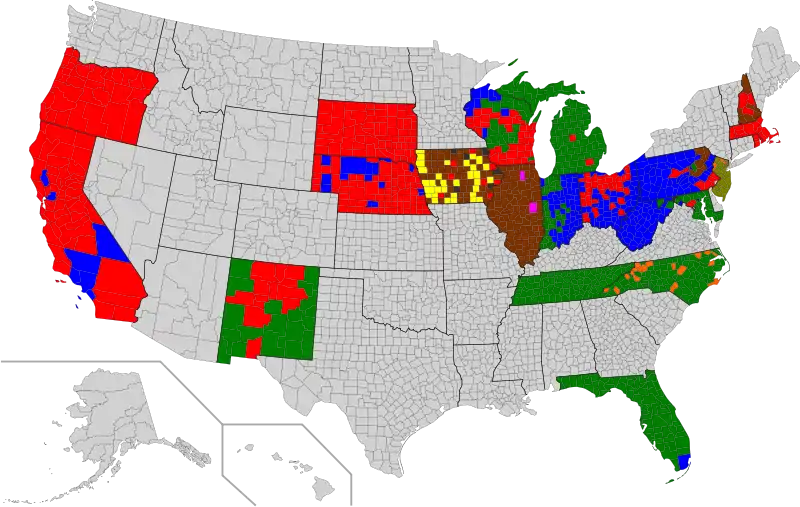 1972 Democratic primary results by county popular vote
|
Total primaries popular vote
| Candidate | Votes | % | |
|---|---|---|---|
| Hubert H. Humphrey | 4,121,372 | 25.8 | |
| George S. McGovern | 4,053,451 | 25.3 | |
| George C. Wallace | 3,755,424 | 23.5 | |
| Edmund S. Muskie | 1,840,217 | 11.5 | |
| Eugene J. McCarthy | 553,955 | 3.5 | |
| Henry M. Jackson | 505,198 | 3.2 | |
| Shirley A. Chisholm | 430,703 | 2.7 | |
| James T. Sanford | 331,415 | 2.1 | |
| John V. Lindsay | 196,406 | 1.2 | |
| Sam W. Yorty | 79,446 | 0.5 | |
| Wilbur D. Mills | 37,401 | 0.2 | |
| Walter E. Fauntroy | 21,217 | 0.1 | |
| Unpledged delegates | 19,533 | 0.1 | |
| Edward M. Kennedy | 16,693 | 0.1 | |
| Rupert V. Hartke | 11,798 | 0.1 | |
| Patsy M. Mink | 8,286 | 0.1 | |
| "None of the names shown" | 6,269 | 0 | |
| Others | 5,181 | 0 | |
| Total votes | 15,993,965 | 100 | |
Analysis
In the end, McGovern succeeded in winning the nomination by winning primaries through grass-roots support in spite of establishment opposition. He had led a commission to redesign the Democratic nomination system after the messy and confused nomination struggle and convention of 1968. The fundamental principle of the McGovern-Fraser Commission—that the Democratic primaries should determine the winner of the Democratic nomination—lasted throughout every subsequent nomination contest. However, the new rules angered many prominent Democrats whose influence was marginalized, and those politicians refused to support McGovern's campaign (some even supporting Nixon instead), leaving the McGovern campaign at a significant disadvantage in funding compared to Nixon.
Notes
- Channing Phillips had previously been placed in nomination at the 1968 convention and won the Washington D.C. delegation but was not a contender for national support.
- Senator Margaret Chase Smith had previously contested the Republican nomination in 1964.
- This should not be taken as a finalized list of results. While a significant amount of research was done, there were a number of Delegates who were not bound by the instruction, or "Pledged" to a candidate, and to simplify the data these delegates were considered "Uncommitted". Many states also held primaries for the delegate positions, and these on occasion were where slates or candidates pledged to a certain candidate might be elected; however, as these elections allowed for a single person to vote for multiple candidates, as many as the number of positions being filled, it is difficult to determine how many people actually voted in these primaries. For this reason, while such results may be found, they are not included in the popular vote summaries at the bottom of the table.
- Technically this is only a partial result; over two dozen counties did not hold caucuses when these results were announced, accounting for around (12%) of the expected number of Caucus goers. However, a full tabulation including these counties was not found. Only percentages were found in terms of the number of delegates elected per candidate, not their number nor their total allotment.
- All were Uncommitted.
- Both are Uncommitted.
- 1,176 SD's were Uncommitted at (32.30%), and 73 SD's were for other candidates at (2.00%).
- Two rival delegate slates were named, as the Mississippi Democratic party was severely divided between White-lead Regulars and Black-lead Loyalists, with their contests being held at different dates. As the Loyalists were the ones seated at the National Convention, it is there slate and nomination date that is presented here.
- All are Uncommitted.
- Includes 954 Write-In votes for Senator Edward Kennedy at (1.07%), 854 Write-In votes for President Richard Nixon at (0.96%), 280 votes for Edward T. Coll at (0.32%), 133 Write-In votes for Congressman Pete McCloskey at (0.15%), 27 Write-In votes for Congressman John Ashbrook at (0.03%), and 19 Write-In votes for Comedian Pat Paulsen at (0.02%)
- All are Uncommitted.
- Includes 242 Write-In votes for Senator Edward Kennedy at (0.02%).
- All are Uncommitted.
- All are Uncommitted.
- Both are Uncommitted.
- Includes 2,450 votes for "None of the Names Shown" at (0.22%).
- All were Uncommitted.
- All were Uncommitted except two, which were pledged to Senator Edward Kennedy.
- Technically won seven delegates, but these delegates were required to vote for McGovern on the first ballot.
- Technically won five delegates, these delegates were technically required to vote for McGovern on the first ballot.
- Technically Uncommmited won one delegate, but they were required to vote for McGovern on the first ballot.
- Includes 2,348 Write-in votes for Senator Edward Kennedy at (0.38%), and 589 votes for Edward T. Coll at (0.10%).
- Includes 262 Write-in votes for President Richard Nixon at (0.02%).
- 45 delegates were technically named later in mid-June, 27 by the elected delegates and 18 by the Democratic State Committee.
- 14 delegates were named later in June.
- 19 delegates were named later in June.
- 11 delegates were named later in June.
- All are Uncommitted.
- 1 delegate was named later in June.
- All were Uncommitted bar one, who was pledged to Senator Edward Kennedy.
- All are Uncommitted.
- All are part of an Anti-Wallace slate.
- A slate of eight delegates supporting Cleveland Mayor Carl Stokes was elected in the 21st District, and a slate of five delegates supporting Congressman Wayne Hays was elected in the 18th District.
- All are Uncommitted.
- Some District Conventions were held earlier in April.
- Includes 293 Write-in votes for Senator Edward Kennedy at (0.15%).
- Uncommitted by state law.
- Uncommitted by state law.
- Uncommitted by state law.
- All are Uncommitted
- All are Uncommitted.
- All are Uncommitted.
- All are Uncommitted.
- Four delegates were picked on May 20.
- All are Uncommitted.
- 10,700 votes are for an Uncommitted slate at (0.67%)
- All are Uncommitted.
- Both are Uncommitted.
- McGovern won eight delegates in these contests, but they were later replaced by Jackson delegates at the state convention.
- All are Uncommitted.
- Includes 12,673 votes for Senator Edward Kennedy at (3.10%), and 480 Write-in votes for President Richard Nixon at (0.12%).
- All votes were for an Uncommitted slate.
- All are Uncommitted.
- All are Uncommitted.
- All are Uncommitted.
- All are Uncommitted.
- All are Uncommitted.
- All are Uncommitted.
- All votes are for an Uncommitted slate.
- All are Uncommitted.
- All are Uncommitted.
- All are Uncommitted.
- This was suspected, not confirmed.
- All are Uncommitted.
- All are Uncommitted.
- All are Uncommitted.
- All are Uncommitted.
- All are Uncommitted.
- All are Uncommitted.
- All are Uncommitted.
- All are Uncommitted.
- Is Uncommitted.
- All are Uncommitted.
- 30 were named on the June 25th by the Democratic State Committee.
- All are Uncommitted.
- All are Uncommitted.
- Includes one delegate supporting Louisiana Governor Edward Edwards, and five delegates supporting Congressman Wayne Hays of Ohio.
References
- Jack Anderson (June 4, 1971). "Don't count out Ted Kennedy". The Free Lance–Star.
- Frum, David (2000). How We Got Here: The '70s. New York, New York: Basic Books. p. 298. ISBN 0-465-04195-7.
- Freeman, Jo (February 2005). "Shirley Chisholm's 1972 Presidential Campaign". University of Illinois at Chicago Women's History Project. Archived from the original on 2015-01-26.
- "CQ Almanac Online Edition".
- "McGovern Shy 130 Votes as Delegate Choice Ends; Tally Finds McGovern is Shy 130 Votes" (PDF). The New York Times.
- "McGovern Assails Nixon on Cambodia" (PDF). The New York Times.
- "Humphrey Joins the Race; Asks U.S. To End War Now; Humphrey in Race; Urges War End Now" (PDF). The New York Times.
- "Wallace Joins Florida Race as Democrat; Wallace Enters Primary in Florida as a Democrat" (PDF). The New York Times.
- "Muskie Formally in Race; Pledges 'a New Beginning'; Muskie Formally in Nomination Race" (PDF). The New York Times.
- "Admits Strategy Failed; Muskie Abandons Primary Contention" (PDF). The New York Times.
- "Jackson Cites Lack of Funds in Quitting" (PDF). The New York Times.
- "Jackson in Race; He Asserts Nixon Fails to Win Trust; Jackson in Race for President; Says Nixon Fails to Win Trust" (PDF). The New York Times.
- "Rep. Mills Officially Enters Race for the Democratic Nomination; Mills Joins Race for Nomination" (PDF). The New York Times.
- "New Hat in Ring: Mrs. Chisolm's; Representative is Seeking Presidency as Democrat Mrs. Chisholm Joins Presidential Race" (PDF). The New York Times.
- "Sanford, Ex-Governor, Runs in Carolina for White House" (PDF). The New York Times.
- "Lindsay, in Race, Scores His Rivals; in Miami, He Also Attacks Nixon -- Says Washington Ignores Cities' Problems Lindsay, in Race, Attacks Nixon and Rivals in Democratic Party" (PDF). The New York Times.
- "Mayor Runs Sixth; Says Returns Indicate He Cannot Continue as a Candidate Lindsay Quits the Race After Sixth-Place Finish" (PDF). The New York Times.
- "McCarthy, Casually, Enters the '72 Race; A Casual McCarthy Enters 1972 Race" (PDF). The New York Times.
- "Yorty Enters Race; Eyes 2 Primaries; Yorty Enters Race; Eyes Two Primaries" (PDF). The New York Times.
- "Minnesotan Won't Quit; Humphrey Concedes Loss in California Voting Today" (PDF). The New York Times.
- "Petitions Raise Hartke Hopes" (PDF). The New York Times.
- "Rep. Mink Withdraws from President Race" (PDF). The New York Times.
- "19 Oct 1971, 10 - Hawaii Tribune-Herald at". Newspapers.com. 1971-10-19. Retrieved 2022-05-27.
- "Harris in Race for Presidency, the Second Democrat to Declare; Harris in Race for Presidency, the Second Democrat to Declare" (PDF). The New York Times.
- "Harris, Declaring 'I Am Broke,' Withdraws from '72 Contention; $40,000 in Debt, Oklahoman Abandons a Short Campaign Based on 'New Populism'" (PDF). The New York Times.
- "27 Apr 1972, Page 8 - The Akron Beacon Journal at". Newspapers.com. 1972-04-27. Retrieved 2022-05-27.
- "Bayh Quits Race; Cites Wife's Illness" (PDF). The New York Times.
- "Hughes Quits as Presidential Aspirant" (PDF). The New York Times.
- "Proxmire States He Will Not Run; Opens Way for McGovern in the Wisconsin Primary" (PDF). The New York Times.
- "31 Mar 1972, Page 2 - El Paso Herald-Post at". Newspapers.com. 1972-03-31. Retrieved 2022-05-27.
- "Black in Capital to Enter Primary; Fauntroy to Run May 2 as Favorite-Son Candidate" (PDF). The New York Times.
- "Humphrey Victor in Ohio Vote; Wallace Wins Tennessee Race; HUMPHREY VICTOR BY SLIM OHIO EDGE" (PDF). The New York Times.
- "15 Nov 1971, Page 30 - The Philadelphia Inquirer at". Newspapers.com. 1971-11-15. Retrieved 2022-05-27.
- "13 Dec 1971, Page 20 - The Ithaca Journal at". Newspapers.com. 1971-12-13. Retrieved 2022-05-27.
- "20 Jan 1972, Page 4 - The Orlando Sentinel at". Newspapers.com. 1972-01-20. Retrieved 2022-05-27.
- "28 Feb 1972, Page 17 - The Ithaca Journal at". Newspapers.com. 1972-02-28. Retrieved 2022-05-27.
- Pantazi, Andrew (2016). "Past Duval Presidential Elections". Jacksonville.com. The Florida Times-Union. Retrieved 25 December 2018.
Later that year segregationist George Wallace would be shot and handicapped, but before then, he won Florida's primary decisively, carrying every county but Miami-Dade.
- "Article Says Nixon Schemed To Tie Foe to Wallace Attack". The New York Times. December 7, 1992. Retrieved March 1, 2020.
- "Nixon Plot to Tie McGovern to Wallace Attack Reported : Archives: Plan to plant campaign flyers is among new disclosures in unreleased tapes, magazine says". Los Angeles Times. December 7, 1992. Retrieved March 1, 2020.
- Salam, Reihan (May 27, 2003). "Double Scoop". The New Republic Online.
- "A Message of Discontent from Wisconsin Archived 2007-11-18 at the Wayback Machine", "AllPolitics", Time, 04-17-1972.
- Bernstein, Carl; Woodward, Bob (10 October 1972). "FBI Finds Nixon Aides Sabotaged Democrats". The Washington Post. Retrieved 24 Dec 2018.
- "Remembering Ed Muskie Archived 1999-04-27 at the Wayback Machine", Online NewsHour, PBS, March 26, 1996
- "Washingtonpost.com: George Wallace Remembered". The Washington Post.
- Miroff. pp. 205.
- Steinem, Gloria. Outrageous Acts. p. 114.
- Editors of Encyclopedia Britannica. "United States presidential election of 1972". Britannica.com. Encyclopedia Britannica. Retrieved 3 August 2019.
- "Delegate Vote". The Arizona Republic. Phoenix, Arizona. January 31, 1972. Retrieved September 24, 2023.
- "Delegate Vote by Democrats Follows Plan". The Arizona Daily Star. Tucson, Arizona. February 13, 1972. Retrieved September 24, 2023.
- "Larson Predicts 19 State Delegates to Back Muskie". The Iowa City Press-Citizen. Iowa City, Iowa. February 28, 1972. Retrieved September 24, 2023.
- "Rival Democratic Factoins Negotiate, Near Unification". The Sun Herald. Biloxi, Mississippi. February 28, 1972. Retrieved September 24, 2023.
- "Mississippi Disupte Is Won By Loyalists". The New York Times. New York, New York. July 9, 1972. Retrieved September 30, 2023.
- "Muskie Gets 14 of 20 Delegates to Nat'l Confab". The Valley News. West Lebanon, New Hampshire. March 11, 1972. Retrieved September 24, 2023.
- "State Demos Favor Unpledged Delegates". The Macon News. Macon, Georgia. March 12, 1972. Retrieved September 24, 2023.
- "Wallace's Victory Freezes Out Florida's Big-Name Delegates". The Miami Herald. Miami, Florida. March 16, 1972. Retrieved September 26, 2023.
- "Muskie Winner Over McCarthy". The Chicago Tribune. Chicago, Illinois. March 22, 1972. Retrieved September 26, 2023.
- "Victory in Illinois a major Plum for Muskie to Take to Wisconsin". The Chicago Tribune. Chicago, Illinois. March 23, 1972. Retrieved September 26, 2023.
- "Muskie Holds On at Iowa Contests". The Des Moines Register. Des Moines, Iowa. March 27, 1972. Retrieved September 24, 2023.
- "Carolina Delegates to Be Uncommitted". The New York Times. New York, New York. March 30, 1972. Retrieved September 30, 2023.
- "McGovern Surges to State Victory". The Wisconsin State Journal. Madison, Wisconsin. April 5, 1972. Retrieved September 26, 2023.
- "Young Demos Deliver Idaho to McGovern". The Idaho State Journal. Pocatello, Idaho. April 18, 1972. Retrieved September 29, 2023.
- "McGovern Has a Solid Lead in State Delegates". The Rutland Daily Herlad. Rutlan, Vermont. May 16, 1972. Retrieved September 28, 2023.
- "McGovern Piles Up Delegates". The Boston Globe. Boston, Massachusetts. April 29, 1972. Retrieved September 26, 2023.
- "The Two Georges". The Philadelphia Inquirer. Philadelphia, Pennsylvania. April 27, 1972. Retrieved September 26, 2023.
- "State Democrats Play 'New Politics' Game in Selecting At-Large Delegates". The News-Item. Shamokin, Pennsylvania. June 12, 1972. Retrieved September 27, 2023.
- "'Kentucky... Ballots For". The Courier-Journal. Louisville, Kentucky. April 30, 1972. Retrieved September 30, 2023.
- "Demos Pick Delegates After All-Night Convention Effort". The Reno Gazette-Journal. Reno, Nevada. May 1, 1972. Retrieved September 27, 2023.
- "Wallace Delegates May Select Blacks". The Montgomery Advertiser. Montgomery, Alabama. May 14, 1972. Retrieved September 28, 2023.
- "Humphrey's 47% Wins Primary". The Indianapolis Star. Indianapolis, Indiana. May 3, 1972. Retrieved September 26, 2023.
- "HHH Claims 6 Delegates From McGovern in Ohio". The Cincinnati Enquirer. Cincinnati, Ohio. May 6, 1972. Retrieved September 27, 2023.
- "Final Returns Give Humphrey Ohio Delegation". The Cincinnati Enquirer. Cincinnati, Ohio. May 11, 1972. Retrieved October 1, 2023.
- "Fauntroy Slate Wins". The Baltimore Sun. Baltimore, Maryland. May 4, 1972. Retrieved September 26, 2023.
- "Presidential Primary Voting Passes 600,000 Over State". The Tennessean. Nashville, Tennessee. May 6, 1972. Retrieved September 27, 2023.
- "Humphrey to Only Get Slim Delegate Margin". The Winona Daily News. Winona, Minnesota. May 8, 1972. Retrieved September 29, 2023.
- "McGovern Wins 18 Delegates to Humphrey's 4 in Final Total". The Lincoln Star. Lincoln, Nebraska. June 6, 1972. Retrieved September 27, 2023.
- "Humphrey Gains Most Delegates". The Beckley Post-Herald. Beckley, West Virginia. May 12, 1972. Retrieved September 27, 2023.
- "Democratic Delegation Largely Uncommitted". The Casper Star-Tribune. Casper, Wyoming. May 14, 1972. Retrieved September 29, 2023.
- "McGovern Gets 2.5 Votes". The Courier-Journal. Louisville, Kentucky. May 15, 1972. Retrieved October 1, 2023.
- "McGovern Backers Claim 12 Delegates – Officially". The Wichita Eagle. Wichita, Kansas. May 14, 1972. Retrieved September 30, 2023.
- "29 Uncommitted Among 40 Demo State Delegates". The Sun Herald. Biloxi, Mississippi. May 14, 1972. Retrieved September 24, 2023.
- "La. Demos Pick Edwards to Head Delegation". The Town Talk. Alexandria, Louisiana. May 21, 1972. Retrieved September 30, 2023.
- "Wallace Convention Support Uncertain". The Detroit Free Press. Detroit, Michigan. May 18, 1972. Retrieved September 27, 2023.
- "Leaders of Democrats Get Message: Change Needed". The Detroit Free Press. Detroit, Michigan. May 18, 1972. Retrieved September 27, 2023.
- "Wallace Gets 67 Delegates". The Detroit Free Press. Detroit, Michigan. June 1, 1972. Retrieved September 27, 2023.
- "Muskie Gets All 20". The Bangor Daily News. Bangor, Maine. May 22, 1972. Retrieved September 24, 2023.
- "Coalition Planning Miami Challange". The Honolulu Star-Bulletin. Honolulu, Hawaii. May 22, 1972. Retrieved September 26, 2023.
- "Challenge to Hawaii Officially Dropped". The Honolulu Advertiser. Honolulu, Hawaii. May 22, 1972. Retrieved September 26, 2023.
- "McGovern and Muskie Split". The Des Moines Register. Des Moines, Iowa. May 21, 1972. Retrieved September 24, 2023.
- "McGovern Wins 9 Delegates". The Battleboro Reformer. Battleboro, Vermont. May 22, 1972. Retrieved September 28, 2023.
- "McGovern Wins All 6 National Delegates at 3rd District Caucus". The Longview Daily News. Longview, Washington. May 22, 1972. Retrieved September 30, 2023.
- "Jackson Capture All of State's 52 Delegates". The News Tribune. Tacoma, Washington. June 25, 1972. Retrieved September 30, 2023.
- "44 Uncommitted Delegates Chosen by State Demos". The St. Joseph News-Press. St. Joseph, Missouri. May 24, 1972. Retrieved September 30, 2023.
- "Strong Showing for McGovern; Wallace Second". The Capital Journal. Salem, Oregon. May 24, 1972. Retrieved September 26, 2023.
- "Without Even Visiting the State, McGovern Sweeps Rhode Island". The Boston Globe. Boston, Massachusetts. May 24, 1972. Retrieved September 27, 2023.
- "Most Alaska Delegates Back Hubert, McGovern". The Olympian. Olympia, Washington. May 31, 1972. Retrieved September 30, 2023.
- "Humphrey Wins Guam Delegates". The Daily Oklahoman. Oklahoma City, Oklahoma. May 29, 1972. Retrieved October 1, 2023.
- "McGovern's in Driver's Seat". The Delaware County Daily Times. Chester, Pennsylvania. May 27, 1972. Retrieved October 1, 2023.
- "McGovern Wins 41 Votes in 5 Contests". The Berkshire Eagle. Pittsfield, Massacshuetts. June 5, 1972. Retrieved September 27, 2023.
- "37 Kentucky Delegates Are Uncommitted; 10 Go to McGovern". The Courier-Journal. Louisville, Kentucky. June 4, 1972. Retrieved September 30, 2023.
- "McGovern's Oklahoma Delegate Strengh Appears Locked at 10". The Lawton Constitution. Lawton, Oklahoma. June 5, 1972. Retrieved September 30, 2023.
- "McGovern Tops HHH 45% to 40% in California, Wins 3 Other States". The Sacramento Bee. Sacramento, California. June 7, 1972. Retrieved September 26, 2023.
- "McGovern Wins Crucial Primary in California". The Argus-Leader. Sioux Falls, South Dakota. June 7, 1972. Retrieved September 27, 2023.
- "McGovern, Wallace Officials OK State Delegate Alignment". The Albuquerque Journal. Albuquerque, New Mexico. June 8, 1972. Retrieved September 27, 2023.
- "Delegates Pick Leaders". The Record. Hackensack, New Jersey. June 13, 1972. Retrieved September 27, 2023.
- "Craig Wins Surprising Victory". The St. Cloud Times. Saint Cloud, Minnesota. June 12, 1972. Retrieved September 29, 2023.
- "Virginia Delegates to Miami Named". The Roanoke Times. Roanoke, Virginia. June 10, 1972. Retrieved September 27, 2023.
- "30 of 53 Seen for McGovern". The Richmond Times-Dispatch. Richmond, Virginia. June 10, 1972. Retrieved September 27, 2023.
- "McGovern Camp Loses Delegate Bid". The Wichita Eagle. Wichita, Kansas. June 11, 1972. Retrieved September 30, 2023.
- "Hearnes Holds Delegation". The Kansas City Star. Kansas City, Kansas. June 11, 1972. Retrieved September 30, 2023.
- "Demo Chief Backs Muskie". The Tulsa World. Tulsa, Oklahoma. June 13, 1972. Retrieved September 30, 2023.
- "Sen. McGovern Pick Up 30 More Delegates". The Bee. Danville, Virginia. June 12, 1972. Retrieved September 27, 2023.
- "Democratic Convention Ends; Delegation Set". The Forth Worth Star-Telegram. Fort Worth, Texas. June 15, 1972. Retrieved September 30, 2023.
- "McGovern Assured of Major Share of Delegates". The Fort Collins Coloradoan. Fort Collins, Colorado. June 18, 1972. Retrieved September 30, 2023.
- "McGovern Assured of Major Share of Delegates". The Colorado Springs Gazette-Telegraph. Colorado Springs, Colorado. June 17, 1972. Retrieved September 30, 2023.
- "McGovern Delegate Total Hits 1,113". The Baltimore Sun. Baltimore, Maryland. June 19, 1972. Retrieved October 1, 2023.
- "McGovern Gets Most Delegates". The South Idaho Press. Burley, Idaho. June 19, 1972. Retrieved September 29, 2023.
- "17 of 20 Montana Demo Delegates to McGovern". The Missoulian. Missoula, Iowa. June 19, 1972. Retrieved September 27, 2023.
- "McGovern Wins 11 of 20 Delegates". The Morning Pioneer. Mandan, North Dakota. June 17, 1972. Retrieved September 30, 2023.
- "Demos Face Job of Selling". The Ogden Standard-Examiner. Ogden, Utah. June 19, 1972. Retrieved September 30, 2023.
- "State Democrats Equally Divided Among Delegates". The Fort Collins Coloradoan. Fort Collins, Colorado. June 19, 1972. Retrieved September 30, 2023.
- "McGovern Delegate Total His 1,113". The Baltimore Sun. Baltimore, Maryland. June 19, 1972. Retrieved October 1, 2023.
- "McGoven Victory a Blow to State Party Leaders". The New York Times. New York, New York. June 22, 1972. Retrieved September 30, 2023.
- "State Democrats Head Off Split". The New York Times. New York, New York. June 25, 1972. Retrieved September 30, 2023.
- "McGovern Wins 5.85 Delegates". The Morning News. Wilmington, Delaware. June 24, 1972. Retrieved September 27, 2023.
- "Jackson Captures All of State's 52 Delegates". The The News Tribune. Tacoma, Washington. June 25, 1972. Retrieved September 30, 2023.
- "Some State Delegates Would Back McGovern". The Camden News. Camden, Arkansas. June 26, 1972. Retrieved September 26, 2023.
- https://timesmachine.nytimes.com/timesmachine/1972/06/27/80794369.html?pageNumber=31
- Kalb, Deborah, ed. (2010). Guide to U.S. Elections (6th ed.). Washington, DC: CQ Press. p. 415. ISBN 9781604265361.
Further reading
- Chisholm, Shirley (1973). The Good Fight. Harper Collins. ISBN 978-0-06-010764-2
_(3x4-1).jpg.webp)
.jpg.webp)
